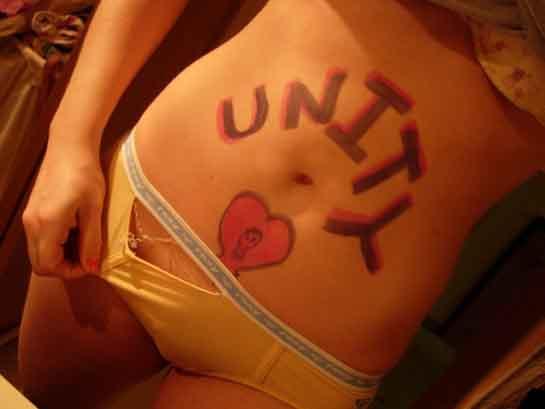WHAT IS LOVE?
Jeff Wismer, November 2006
I say Love is Creation of Unity, which can
certainly do without some traditional vestiges of the past.
What does Wikipedia say about Love?
©©©©©©©©©©©©©©©©©©©©©©©©©©©©©©©©©©©©©©©©©©©©©
Love
is a profound feeling of tender affection, or intense attraction. People in
love are often considered to have "good" interpersonal chemistry.[1]
Love is described as a deep, ineffable feeling shared in passionate or intimate
interpersonal relationships. In different contexts, however, the word love has
a variety of related but distinct meanings: in addition to romantic love, which
is characterized by a mix of emotional and sexual desire, other forms include platonic
love, religious love, familial love, true love, and the more casual application
of the term to anyone or anything that one considers strongly pleasurable,
enjoyable, or desirable, including activities and foods. This diverse range of
meanings in a single word is commonly contrasted with the plurality of Greek
words for Love, reflecting the word's versatility and complexity.
©©©©©©©©©©©©©©©©©©©©©©©©©©©©©©©©©©©©©©©©©©©©©
What do I mean by Creation of Unity?
Well symbolically speaking…how about this…

or this….

Well now that I have your attention…
My efforts will be to try to describe a healthier way to look at something we
all mentally construct, put into action, and make emotionally relevant in our
lives.
FIRST….
What really bothers me is how I would make a stronger commitment to someone
else without involving the church or the government. Well obviously I would
want to rule out the church, which can be done fairly easily. But what about
the government…is it really their business what I do with my personal life?
What a dilemma! What a quandary! What the fuck?
Anyway, you’ve met someone and the chemistry is there, and you need that person
in your life, and you wish to create a stronger unity with the other.
What are your options?
A. Living together for a long time may automatically constitute a common-law
Marriage in some states.
B. Getting married usually by a justice of the peace involves the government
and you become legally married.
C. Live separately from each other.
If you’re not a traditionalist, nor do you like to involve authoritarian
figures into the equation, like I do, we may look at Love & Marriage in a
different light than others do. I see two things effecting Love negatively:
1. Appliance of dogmatic beliefs.
2. Institutionalizing the process.
Traditionalism seems to get in the way of adjusting ourselves to new
discoveries in cognitive psychology. Instead of applying new ways of looking at
Love & Marriage, we desperately and foolishly cling to the vestiges of the
past. Extreme unhealthy fear of change takes over.
FEAR LEADS TO FIGHT
Truly it would be a pity if we would to allow ourselves to be deceived by
extreme amounts of fear in something as important as love. We spend all our
days recognizing the faults of authoritarianism, and fundamentalist dogmatism,
yet when it comes to other disciplines in life, such as love, we let our guards
down. Whenever we let our guards down we allow unhealthy fear to strike, and we
fight against our own humanity.
Do we really want to take the other person’s last name?
I just see no reason to institutionalize something that is meant to be a
personal creation of unity. I think anytime you get the government involved in
something so personal, you’re making matters so much more difficult than they
are already.
The middle ground seems to be where most people come to an agreement and that’s
really what I’m suggesting. Throw out some of the unhealthy traditions and
strengthen the healthier ones.
SOME TRADITIONS ARE VERY USEFUL AND A LOT OF FUN
For instance when we fall deeper in love with someone, we naturally look to
make more of a commitment to strengthen the bond we share with the other. We’re
creating a unity based upon the Love that is shared. I think the traditions of
offering an engagement ring and other such commitments are actually quite
effective. One is proposing that the other create a stronger unity and thus
sacrifice other opportunities in favor of the opportunity at hand. Furthermore,
I like the idea of having a ceremony in which that creation of unity is shared
with the community at large in a celebratory manner.
It is at this point that I feel the need to redefine the traditional marriage
and steer in a different direction. I always say humanity is difficult enough
to embrace as it is, so please don’t had any dogmatic or institutionalized
burdens. But we did anyway. Before it was enough to scare people into believing
something terrible would happen to them if they broke their marriage vows.
That’s losing its punch these days, the more and more we reject the old tenants
of dogmatic religiosity. Now it seems the state, or the federal government is
the one using its power to dissuade people from breaking their marriage vows.
It’s all a bunch of crudshamupidness.
WHO WOULD I WANT TO PRESIDE OVER THE CELEBRATION?
NOT the justice of the peace, or minister, or whatever you want to call him or
her. What’s their purpose in all of this? Do we really need someone
administering our personal creation? I think we are more than capable of taking
accountability for our own actions, without feeling the need to involve big
brother and big sister. If you want to have someone lead the celebratory
ceremony, wouldn’t you want to have an expert of love, and the creation of
unity?
I’ll tell you what if Stephen A. Mitchell, author of “Can Love Last, the Fate
of Romance over Time”, was still alive….

I would ask him to speak at my ceremony.
In his
final book Stephen A. Mitchell really goes in depth into
the cognitive science behind love & romance. In it he describes love &
romance as a “sandcastle for two”…meaning always being knocked down and having
to be built back up again.
I certainly wouldn’t want someone presiding over something so personal,
important, and special that they themselves have not thoroughly studied.
Stephen A. Mitchell would have been my first choice, as well as some others I
have come to respect immensely. Why not have a group of speakers, each one
offering their own unique perspective. But not just anyone of course, I would
keep it focused on the theme of unity.
Anyway, these are the thoughts of a man lying awake one night wondering…what if
and how come, and why not.
So don’t be surprised when you see invitations from the
secular/atheist/agnostic community with the title “Come Celebrate the Unity of
_____ & _____”